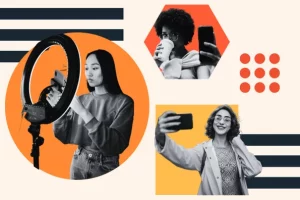Introduction Digital content creation has undergone a transformation over the past few decades, evolving from simple text-based websites to complex multimedia experiences. As we look to the future, the landscape of digital content creation is poised to change even more dramatically. This article delves into the emerging trends, technologies, and methodologies that will shape the
Introduction
Digital content creation has undergone a transformation over the past few decades, evolving from simple text-based websites to complex multimedia experiences. As we look to the future, the landscape of digital content creation is poised to change even more dramatically. This article delves into the emerging trends, technologies, and methodologies that will shape the future of digital content creation.
The Evolution of Digital Content Creation

Image by: Google.com
- Early Days: Text and Basic Graphics
The inception of digital content creation can be traced back to the early days of the internet, where content was primarily text-based with basic graphics. Websites were simple, often static, and focused on delivering information rather than engaging experiences.
- Multimedia and Interactivity
The advent of faster internet speeds and advanced web technologies ushered in a new era of multimedia and interactivity. Videos, animations, and interactive elements became integral parts of digital content, making it more engaging and dynamic.
- Mobile Revolution
The proliferation of smartphones and tablets revolutionized digital content creation. Content had to be optimized for various screen sizes and touch interfaces, leading to the rise of responsive design and mobile-first strategies.
Emerging Trends in Digital Content Creation

Image by: Google.com
- Artificial Intelligence and Machine Learning
Artificial Intelligence (AI) and Machine Learning (ML) are set to revolutionize digital content creation. AI-powered tools can generate content, analyze user behavior, and personalize experiences like never before. For instance, AI can create written content, design graphics, and even produce videos, significantly reducing the time and effort required by human creators.
- Virtual and Augmented Reality
Virtual Reality (VR) and Augmented Reality (AR) are transforming how we interact with digital content. VR provides immersive experiences, making users feel as if they are part of the content. AR overlays digital information onto the real world, enhancing the way we perceive and interact with our surroundings. These technologies are opening up new possibilities for storytelling, education, and entertainment.
- Blockchain and Decentralized Content
Blockchain technology is introducing the concept of decentralized content creation and distribution. This ensures transparency, security, and ownership of digital content. Creators can monetize their work directly, without intermediaries, and audiences can verify the authenticity of the content they consume.
- Voice Search and Smart Assistants
The rise of voice search and smart assistants like Amazon Alexa, Google Assistant, and Apple’s Siri is changing how content is discovered and consumed. Digital content creators need to optimize their content for voice search, ensuring it is easily accessible and relevant to voice queries.
- User-Generated Content
User-generated content (UGC) is becoming increasingly important. Social media platforms, forums, and review sites are filled with content created by users. Brands are leveraging UGC to build trust and authenticity, encouraging their audiences to share experiences and opinions.
Technologies Shaping the Future of Digital Content Creation

Image by: Google.com
- Content Management Systems (CMS)
Modern Content Management Systems (CMS) are becoming more sophisticated, incorporating AI and ML to streamline content creation and management. These systems offer features like automated content generation, real-time analytics, and personalized content delivery.
- Cloud Computing
Cloud computing is enabling collaborative content creation, allowing teams to work together in real-time, regardless of their physical location. It also provides scalable storage and processing power, making it easier to handle large volumes of digital content.
- 5G Connectivity
The rollout of 5G networks promises faster internet speeds and lower latency, enabling the seamless delivery of high-quality digital content. This will enhance the user experience, particularly for streaming video, VR, and AR applications.
- Advanced Analytics
Advanced analytics tools are providing deeper insights into user behavior and content performance. This data-driven approach allows creators to optimize their content strategy, ensuring it resonates with their target audience.
Methodologies for Effective Digital Content Creation

Image by: Google.com
- Content Strategy
A well-defined content strategy is crucial for successful digital content creation. This involves understanding the target audience, setting clear objectives, and planning the type of content that will achieve those goals.
- SEO and Content Optimization
Search Engine Optimization (SEO) remains a key component of digital content creation. Optimizing content for search engines ensures it reaches a wider audience. This includes keyword research, on-page optimization, and building high-quality backlinks.
- Storytelling
Effective storytelling is at the heart of engaging digital content. Whether it’s a blog post, video, or social media update, telling a compelling story can capture the audience’s attention and create an emotional connection.
- Visual and Multimedia Content
Visual and multimedia content, such as images, videos, and infographics, are more engaging than text alone. Incorporating these elements into digital content can enhance its appeal and effectiveness.
- Personalization
Personalization involves tailoring content to the individual preferences and behaviors of users. This can be achieved through AI and ML, which analyze user data to deliver personalized content recommendations.
Conclusion
The future of digital content creation is exciting and full of possibilities. Emerging technologies like AI, VR, and blockchain are set to transform how content is created, distributed, and consumed. By staying abreast of these trends and adopting innovative methodologies, digital content creators can continue to engage and captivate their audiences in new and meaningful ways.
As we move forward, the focus will be on creating immersive, personalized, and interactive experiences that resonate with users. The landscape of digital content creation is ever-evolving, and those who embrace change and innovation will be well-positioned to thrive in this dynamic environment.
















